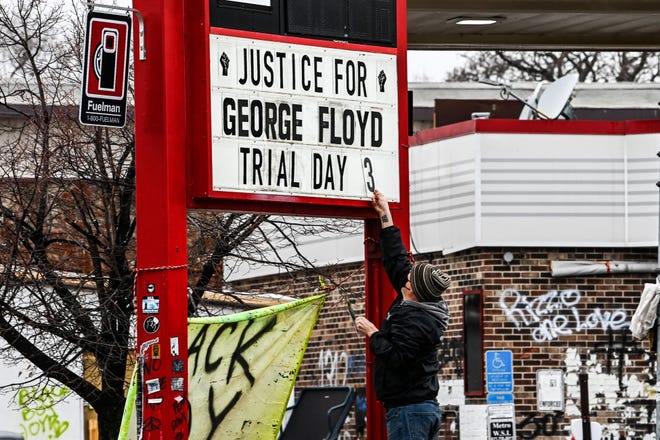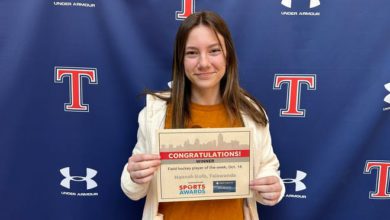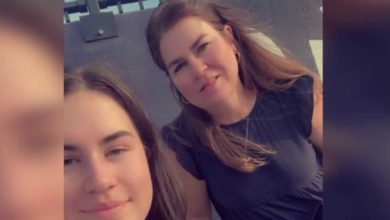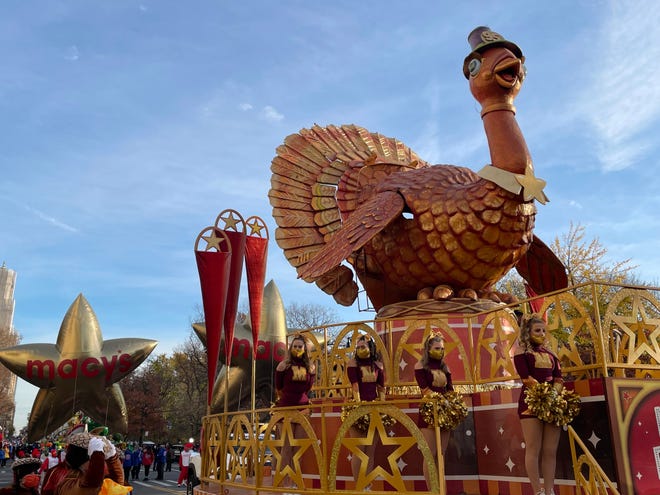
MINNEAPOLIS — Fencing and concrete barriers encircle the county government center. Nearby businesses are boarded up. And the intersection at 38th Street and Chicago Avenue, where George Floyd died, remains closed to traffic.
But the Rev. Billy G. Russell welcomed Minneapolis residents into his church Sunday night for a prayer service.
"We’re trying to get on the front end of all of this to prepare peoples' minds and hearts for what’s about to happen," said Russell, pastor at Greater Friendship Missionary Baptist Church. "Everybody’s on edge right now."
Ten months since the death of George Floyd in police custody, opening statements are set to begin Monday in the murder trial of former Minneapolis police officer Derek Chauvin. Local activists planned rallies and vigils Sunday to honor Floyd's life and draw attention to the case.
What is justice? In Derek Chauvin case, a weary city that wears George Floyd's face waits for an answer
Who's on the jury?:Jury selected in the trial of former police officer Derek Chauvin
Russell held an evening vigil at his church with members of Floyd's family, the Rev. Al Sharpton and civil rights attorney Ben Crump. Russell said he watched most of jury selection over the past three weeks and planned to continue following the trial.
A few dozen supporters gathered at Greater Friendship Missionary Sunday night to hear songs, prayers and speeches during the vigil and rally.
The mood in the sanctuary was joyful as Russell welcomed the crowd from behind the podium where Sharpton gave the eulogy at Floyd’s funeral.
He urged them to pay attention to the trial and protest peacefully.
Protesters — some chanting, drumming and holding portraits of Floyd — demonstrated outside the courthouse throughout the 11 days of jury selection, which concluded last week. Some said they planned to protest throughout the rest of the trial.
“Now is the time for putting out effort toward winning. It’s high time for victory,” Russell said.
Sharpton, when he spoke, pointed out that many cases never resulted in criminal charges against the officers involved, citing past incidents including the beating of Rodney King and the killing of Eric Garner. He said that Monday marks not only the beginning of Chauvin’s trial but an opportunity for the country to hold police accountable.
Garner's mother Gwen and Daniel Prude’s family were in attendance at the prayer service. Garner was killed when an officer placed him in a chokehold in 2014, and Prude died after officers put physical pressure on his head and body just three months before Floyd's death.
“The criminal justice system is on trial tomorrow,” Sharpton said. “Chauvin is in the court room, but America is on trial.”
Floyd’s brothers, Philonise and Terrence, spoke at the vigil about the need to reform the criminal justice system.
“We’re asking the system for the justice but this gathering we’re doing right now is what’s needed,” Terrence Floyd said. “We need justice, we need it now!”

George Floyd kin joins protest anthem album project
Earlier that afternoon, more than a dozen local organizations rallied at the Minneapolis Government Center Sunday afternoon.
"We want to give folks a space to come together and talk about what we’ve been experiencing through the jury selection process," said Chauntyll Allen of Black Lives Matter Twin Cities. "And to let the system know we’re paying attention. We're paying attention to details, and we will continue to show up."
Members of A Mother’s Love, a community group that works to de-escalate gun violence and domestic violence situations, were downtown each day of jury selection dressed in bright pink T-shirts and black jeans, handing out fliers offering emotional support and encouraging residents to demonstrate peacefully.
"It’s about making sure people have a safe place to grieve," said DonEsther Morris, director of the initiative and a Twin Cities native. "The community is still grieving the loss of businesses that were there last summer. We’re still rebuilding."
Morris said that "there is a little bit of a sense of increased tension" as opening statements approach. "It’s more increased apprehension about how the trial is going to go," she said.
Morris said she planned to attend the vigil at Greater Friendship Missionary Baptist Church. The day "is for prayer and peace across the city, no matter what," she said.
Members of the Minnesota National Guard have been stationed outside the courthouse, but officials said last week that there have been no arrests related to the trial and no reports of property damage. Police officials said they planned to increase their presence as opening statements begin.
"It will not be a dramatic increase," Minnesota Department of Public Safety Commissioner John Harrington said at a news conference last week. "At this time, there is no information or intelligence that would justify a major increase in our posture."
Floyd, a Black man, died on May 25, 2020, after Derek Chauvin, who is white, pinned his knee against Floyd’s neck for more than nine minutes. Lying on a Minneapolis street under Chauvin, Floyd cried out "I can’t breathe" more than 20 times.
The incident sparked hundreds of protests worldwide. While the majority of protests were peaceful, hundreds of Minneapolis businesses were looted, and a police station was set on fire.
Jury selection in the trial began in early March. The court faced some early setbacks after the city announced a $27 million settlement with the Floyd family. Two jurors who were already seated on the jury told the judge they could no longer be impartial after seeing the news, and they were cut from the jury.
Attorneys for the defense and prosecution worked through more than 100 potential jurors, asking them each about their knowledge of the case and opinions on a range of issues, including discrimination, policing of communities of color and the Black Lives Matter movement.
The court ultimately selected 15 jurors. Twelve of the jurors will deliberate, two will serve as alternates, and one will be dismissed if all the others show up for opening statements Monday. The panel is made up of nine white jurors and six jurors of color, including three Black men, one Black woman and two mixed-race women.
Source link









